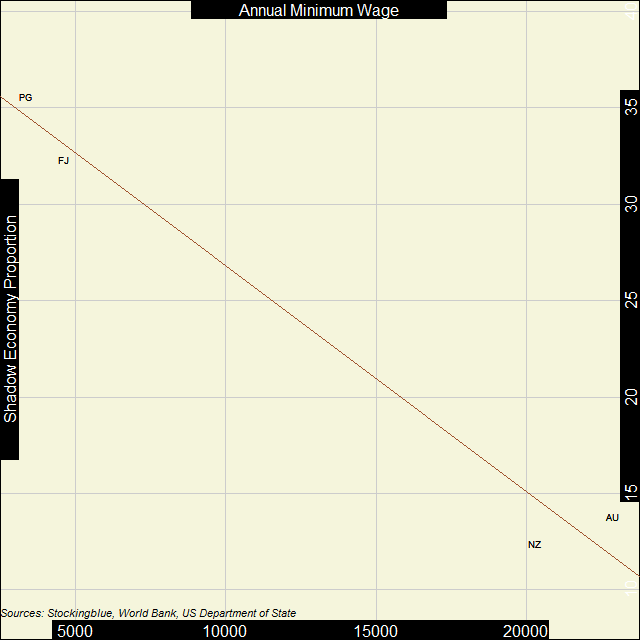
In Oceania, the inverse correlation between the strength of the shadow economy and the minimum wage is extremely strong. However, the sample size if four countries so it needs more data.
Findings
- The correlation coefficient between per capita Gross Domestic Product (GDP) in Purchasing Power Parity (PPP) and minimum wage in Oceania is -0.99.
- As the shadow economy increases in the continent, the minimum wage decreases.
- New Zealand has the weakest shadow economy and the second highest minimum wages.
- Australia has the second weakest shadow economy and the highest minimum wage.
- Papua New Guinea has the lowest minimum wage and strongest shadow economy.
- Only Papua New Guinea has a shadow economy that takes up more than one-third of its overall economy.
Caveats
- As always, correlation does not imply causation.
- American Samoa, Antarctica, Cook Islands, French Polynesia, Guam, Kiribati, Marshall Islands, Micronesia, Nauru, New Caledonia, Niue, Norfolk Island, Northern Mariana Islands, Palau, Pitcairn, Samoa, Solomon Islands, Tokelau, Tonga, Tuvalu, Vanuatu, and Wallis and Futuna were missing data.
- Minimum wages sometimes vary by profession and other variables.
Details
The dataset is too small to infer a serious relationship but it does show a correlation in Oceania. We do not see a geographic clustering however.
There is a very strong correlation between the strength of a shadow economy and the minimum wage.
Country Codes
| Code | Country | Annual Minimum Wage | Shadow Economy (as Percentage of GDP) |
|---|---|---|---|
| AU | Australia | 22,924 | 13.8 |
| FJ | Fiji | 4,624 | 32.3 |
| NZ | New Zealand | 20,306 | 12.4 |
| PG | Papua New Guinea | 3,343 | 35.6 |
Sources
US Department of State. 2017. "Country Reports on Human Rights Practices for 2016." Accessed September 2, 2017. https://www.state.gov/j/drl/rls/hrrpt/humanrightsreport/index.htm#wrapper.
Schneider, Friedrich, Andreas Buehn, and Claudio E. Montenegro. 2010. "Shadow Economies All over the World: New Estimates for 162 Countries from 1999 to 2007." The World Bank Development Research Group.